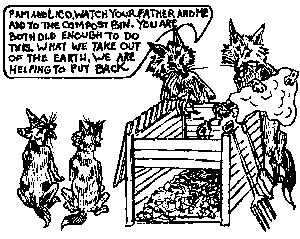Doing things nature's way will help maintain the delicate balance that keeps our environment healthy. At times that means accepting the land the way it is.
Healthy lawns, trees and gardens can prevent erosion, shade our homes
in summer, and filter rainwater runoff. But if too much pesticide and fertilizer
is used, our waters can become polluted from runoff. Earthworms, ladybird
beetles (ladybugs), and spiders will help keep your soil and plants healthy.
Bats are voracious insect-eaters. All these creatures thrive in chemical-free
gardens!

Caretaker's Checklist
- Plant native trees and shrubs that are already adapted to local growing conditions. Choose grasses and plants that tolerate drought.
- Test your soil before fertilizing and apply only the amount needed. The Agricultural Extension Service offers free soil testing.
- Mulch gardens to reduce weeds and promote favorable conditions and habitats for beneficial insects and spiders.
- Develop a tolerance for some weeds and destruction by insect pests.
- Keep grass mowed regularly and allow grass clippings to fall. They will enrich the soil and reduce the need for water. Clover in your lawn reduces the need for nitrogen fertilizer.
- Consider substituting trees, shrubs and ground cover for lawn areas.
- Set aside a corner of your yard to start a compost pile.
 See
your Agricultural Exten- sion Agent for suggestions. American homeowners
spend more than a billion dollars a year on pesticides. Acre for acre,
more fertilizer and pesticides are used on home lawns and gardens than
on the nation's farms.
See
your Agricultural Exten- sion Agent for suggestions. American homeowners
spend more than a billion dollars a year on pesticides. Acre for acre,
more fertilizer and pesticides are used on home lawns and gardens than
on the nation's farms.